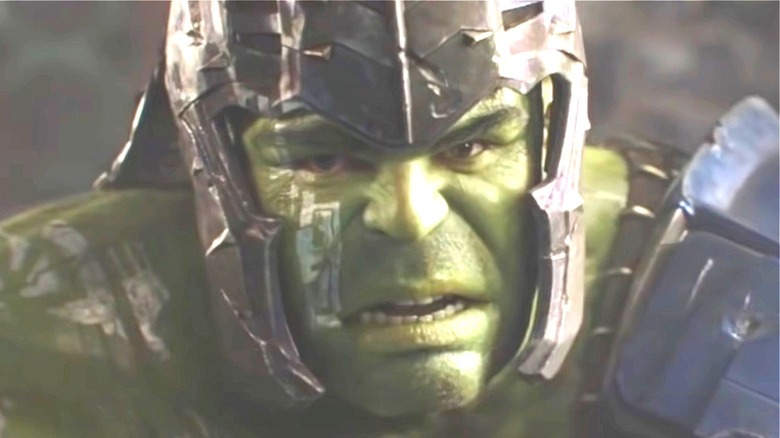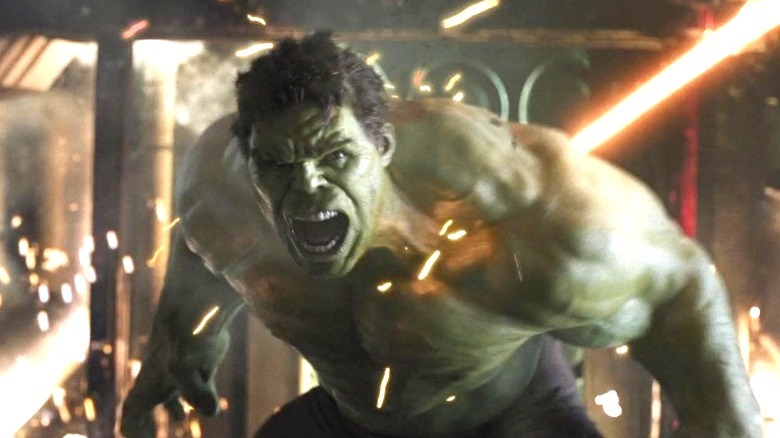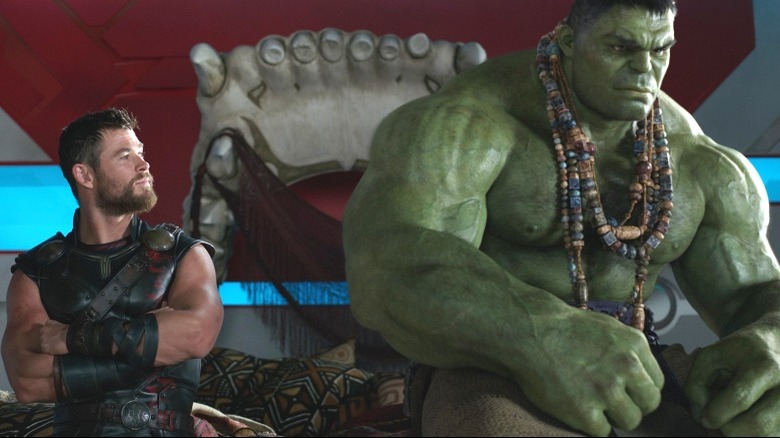Why Mark Ruffalo's Thor: Ragnarok Performance Is More Important Than You Think
The Hulk has had one of the most tumultuous MCU careers of any comic-to-screen Marvel personality. The character debuted as the second-ever hero to get their own solo movie, with "The Incredible Hulk" premiering within weeks of "Iron Man" in 2008. However, Bruce Banner's solo movie didn't make quite the same splash as Tony Stark's.
This had a lot to do with Edward Norton's moody performance. While Norton's interpretation of the character was good in its own way, it didn't fit well in the fledgling lighthearted universe that surrounded it. Although it's not exactly clear why, Edward Norton was fired and Mark Ruffalo was brought in to take his place. Easy fix, right? Wrong.
While most fans found Ruffalo to be a welcome upgrade, there was also the fact that Disney and Marvel Studios had to tiptoe around rights issues for years. This meant that, for a while, the Hulk only made appearances alongside other heroes in the MCU. Even so, the Ruffalo reboot was a comparative success. First, he portrayed the unassuming yet brilliant Dr. Banner in the first two "Avengers" films. Then, things got even better as the studio told a three-part Hulk story arc over the course of "Thor: Ragnarok," "Avengers: Infinity War," and "Avengers: Endgame."
Needless to say, the "Hulk" franchise has had an incredibly complex journey over the course of the first decade-plus of the MCU. From recastings to shifts in tone to new storylines, the two-part character took a long while before it really hit its stride. While there are many transformative aspects of the Hulk's story, though, there's one off-beat, behind-the-scenes aspect of his metamorphosis that sums up the official arrival of the jade giant as a bonafide, well-rounded character in the MCU: his voice.
Voicing the Hulk
It's always been easy to recognize who's played the live-action Bruce Banners that have appeared on-screen over the decades. Back in the '70s and '80s, it was Bill Bixby. In 2003, it was Eric Bana. In 2008, it was Edward Norton. In 2012, it was Mark Ruffalo. It was always easy to identify who was playing the character because, well, you could see them.
When it comes to the Hulk, though, things are much more complicated. In the '70s show, it was clearly the one and only Lou Ferrigno. But after that, CGI got better and the Big Green Guy became a computer-generated freak that would only occasionally utter gruff monosyllabic statements. This meant that, by the time the MCU started, it was impossible to tell who was voicing the character. Of course, that's what IMDb is for, right? A quick peek behind the scenes shows that it was none other than the Big Guy, Lou Ferrigno, himself reprising the role for the Hulk's first few MCU appearances — even if he didn't actually voice the Hulk in his own show.
Having Ferrigno voice the MCU's Hulk was a fun bit of backdoor trivia. It was easy to do too. After all, the Hulk said very little in his solo movie. He said even less in the first two "Avengers" flicks. And bringing in the old-school Marvel icon to say the lines was a fun Easter egg for fans.
But then we got to "Thor: Ragnarok," and the Hulk stepped into a much larger role. He had multiple lines, several of which were rather lengthy for his childish vocabulary. This larger role for both Banner and the Hulk led to the decision to finally give the entire kit and caboodle to Mark Ruffalo himself.
Banner and the Hulk become one
Mark Ruffalo took a while to settle in and truly claim his role as the MCU's Hulk. He arrived as a replacement casting for a character that had a minimal role in the first two movies where he made appearances. He didn't even voice the Hulk during this time.
However, when Ruffalo was handed the reigns to the entire persona in "Thor: Ragnarok," we finally got to see what he could do with the material — and the results were magical. Few would argue with the fact that Ruffalo's "Ragnarok" performance is among his best in the MCU so far. Not only is Bruce Banner fun to watch, but the actor also voiced the Hulk's increasingly verbose, thoughtful personality and acted out the Hulk's movements, using motion-capture technology to truly deliver a Ruffalo-inspired version of Jolly Green (via ComicBook.com).
This combination delivered the most complete iteration of the character that the MCU has ever seen. On top of that, it set the stage for Ruffalo to continue to develop the Banner and Hulk dichotomy through its lowest point in "Infinity War" and on to its ultimate reconciliation as Professor Hulk in "Endgame."
Ruffalo's role in the MCU isn't over yet. Since his three-part arc ended, he has already made an appearance in the post-credits scene of "Shang-Chi and the Legend of the Ten Rings" and will have a role in the upcoming "She-Hulk" series. While any appearance of Big Green is always fun, though, there's a special element to getting to see Ruffalo's versions of Banner and the Hulk now that the character has finally materialized into a consistent, predictable presence under the steady influence of a single, gifted actor.


